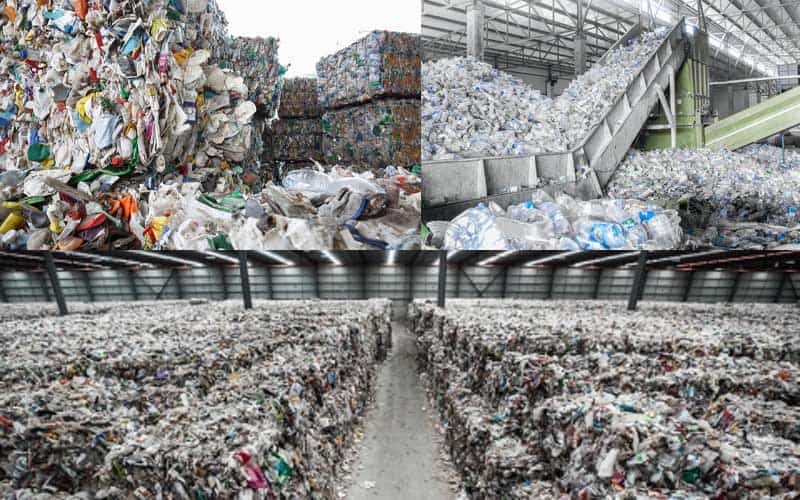As we commemorate the 54th Earth Day on April 22, 2024, the imperative to confront plastic pollution becomes increasingly urgent. Under the theme "Planet vs. Plastic," this year's Earth Day underscores the critical need to address the escalating crisis of plastic pollution. With a target to reduce plastic production by 60% before 2040, the construction industry emerges as a pivotal player in this global endeavour.
Understanding the Scale of the Challenge
Plastic pollution presents a monumental challenge, with staggering statistics highlighting its exponential growth over the decades. From a modest two million tons in 1950, global plastic production has surged to over 450 million tons today. Perhaps even more alarming is the revelation that half of all plastics ever manufactured have been produced in the last 15 years alone, with projections indicating a doubling of production by 2050. This relentless expansion of plastic production places an unprecedented strain on our planet's ecosystems, exacerbating environmental degradation and threatening biodiversity.
Consequences of Plastic Pollution
The consequences of plastic pollution reverberate across ecosystems, with marine environments bearing the brunt of its impact. Each passing minute sees over one million plastic water bottles sold globally, contributing to the staggering 11 million tons of plastic waste that inundate our oceans annually. Marine life suffers as plastic debris ensnares and suffocates wildlife, while microplastics infiltrate the food chain, posing grave risks to both marine organisms and human health. The pervasive presence of plastic pollution underscores the urgent need for decisive action on a global scale.
Global Efforts to Combat Plastic Pollution
In response to the escalating crisis of plastic pollution, concerted efforts are underway at the international level to enact meaningful change. Central to these efforts is the development of a groundbreaking treaty aimed at eliminating plastic pollution by 2040. This ambitious initiative, spearheaded by the United Nations Intergovernmental Negotiating Committee, reflects a collective commitment to addressing one of the most pressing environmental challenges of our time. Additionally, governments worldwide are implementing policies and regulations to curb plastic usage, promote recycling, and foster the adoption of sustainable alternatives.
Construction Industry - A Major Contributor to Plastic Pollution

The construction sector significantly adds to plastic pollution through its reliance on plastic-based materials, single-use plastics on construction sites, and the extensive use of plastic packaging for materials and supplies. From PVC pipes to insulation foam and plastic sheeting, many construction materials contain plastic components, contributing to both the demand for virgin plastic production and the accumulation of plastic waste. Moreover, the industry's reliance on single-use plastics for packaging, disposable items, and on-site operations further exacerbates the problem, as these plastics often end up in landfills or polluting natural environments when improperly disposed of.
To address the construction sector's contribution to plastic pollution, concerted efforts are needed to adopt sustainable practices and reduce reliance on plastic materials throughout the construction lifecycle. This includes promoting the use of alternative, eco-friendly materials, minimizing single-use plastics on construction sites, implementing robust recycling programs, and advocating for policies that incentivize sustainable construction practices. By embracing innovation and prioritizing environmental stewardship, the construction industry can play a significant role in mitigating its impact on plastic pollution and fostering a more sustainable future for generations to come.
Strategies to Mitigate Plastic Pollution
 The Role of Businesses
The Role of Businesses
Businesses within the construction industry wield significant influence in the fight against plastic pollution. By prioritizing sustainability in their operations, construction companies can drive meaningful change and minimize their environmental footprint. Strategies such as optimizing supply chains for sustainability, conducting comprehensive Life Cycle Assessments of products, and designing with end-of-life considerations in mind can help reduce reliance on plastic materials and promote circular economy principles. Moreover, investing in research and innovation can pave the way for the development of alternative materials to plastic, further advancing sustainable practices within the industry.
Individual Actions
While systemic change is essential, individual actions also play a crucial role in combating plastic pollution. Everyday choices, such as opting for reusable bottles and bags, contribute to reducing single-use plastic consumption and fostering a culture of sustainability. Earth Day events provide platforms for community involvement in clean-up initiatives and awareness-raising efforts, empowering individuals to be agents of change in their communities.

Ten Actionable Tips
The construction industry stands at the forefront of efforts to address plastic pollution, given its significant contribution to plastic waste generation. To minimize its environmental impact, the industry can adopt a range of sustainable practices and initiatives. Here are ten actionable tips for reducing plastic pollution in construction:
1. Choose Eco-Friendly Materials: Opt for eco-friendly building materials such as recycled steel and reclaimed wood to minimize reliance on plastic-based products.
2. Minimize Single-Use Plastics: Implement policies to minimize single-use plastics on construction sites, replacing them with reusable alternatives wherever possible.
3. Establish Recycling Programs: Establish robust recycling programs to manage plastic waste generated during construction projects, ensuring proper disposal and recycling of materials.
4. Incorporate Recycled Plastics: Incorporate recycled plastic materials into construction projects to reduce demand for virgin plastic and promote the circular economy.
5. Prioritize Sustainable Design: Prioritize sustainable design practices, including energy-efficient features and low-impact materials, to reduce environmental footprint.
6. Invest in Research: Invest in research and development of alternative materials to plastic, such as bio-based plastics, to expand sustainable options within the industry.
7. Support Packaging Initiatives: Support initiatives to reduce plastic packaging in construction supply chains, opting for sustainable packaging alternatives.
8. Educate Workers: Educate construction workers on the importance of reducing plastic use and proper waste management practices to foster a culture of sustainability.
9. Partner with Suppliers: Partner with suppliers committed to sustainable packaging and materials, ensuring alignment with environmental goals.
10. Advocate for Policies: Advocate for policies and regulations that incentivize sustainable practices in construction, promoting industry-wide adoption of environmentally friendly measures.
Conclusion
Earth Day 2024 serves as a poignant reminder of the urgent need to address plastic pollution and its far-reaching impacts on our planet and its inhabitants. The construction industry, as a major contributor to plastic waste generation, has a crucial role to play in this global effort. By implementing sustainable practices, reducing reliance on plastic materials, and fostering a culture of environmental stewardship, construction companies can contribute to mitigating the impacts of plastic pollution and advancing towards a more sustainable future.
As we move forward, it is imperative that governments, businesses, and individuals continue to work together to enact meaningful change. Through collective action, advocacy, and innovation, we can overcome the challenges posed by plastic pollution and create a healthier, more resilient planet for future generations. On this Earth Day and beyond, let us reaffirm our commitment to protecting our planet and taking decisive steps towards a plastic-free future. Together, we can make a difference and ensure a sustainable legacy for generations to come.









.png)